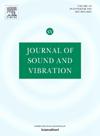Adaptive generalized dispersive mode decomposition: A data-driven approach for nonlinear dispersive component extraction in mechanical systems
IF 4.3
2区 工程技术
Q1 ACOUSTICS
引用次数: 0
Abstract
Dispersive signals are commonly encountered in mechanical systems and dispersion feature extraction is a critical task in various mechanical engineering applications such as fault diagnosis and nondestructive testing. However, traditional methods for decomposing dispersive signals, including generalized dispersive mode decomposition (GDMD) and nonlinear dispersive component decomposition, are heavily reliant on prior information such as initial group delay (GD), bandwidth parameters, and the number of modes. This reliance limits their adaptability in mechanical vibration signal analysis, particularly in extracting close dispersion features. To address these issues, this paper proposes a novel data-driven approach termed adaptive generalized dispersive mode decomposition (AGDMD). First, a frequency-varying low-pass filter based on dispersion compensation is constructed and then a fully data-driven GD estimation algorithm is proposed to determine effective initial GD. Subsequently, an adaptive bandwidth estimation strategy guided by initial GDs is devised to initialize and refine bandwidth parameters of the optimal dispersion compensation algorithm. Finally, according to the initial GDs and bandwidth parameters, the AGDMD adopts a recursive framework to sequentially extract nonlinear dispersive modes from the original signal. Simulated examples and real-life applications to railway fault diagnosis and Lamb wave analysis demonstrate that the proposed AGDMD has both high adaptability and good noise robustness, and can accurately extract close dispersive modes without excessive prior information.
自适应广义色散模式分解:一种数据驱动的机械系统非线性色散分量提取方法
机械系统中经常会遇到色散信号,色散特征提取是故障诊断和无损检测等各种机械工程应用中的一项关键任务。然而,传统的色散信号分解方法,包括广义色散模式分解(GDMD)和非线性色散分量分解,严重依赖于初始群延迟(GD)、带宽参数和模式数等先验信息。这种依赖限制了它们在机械振动信号分析中的适应性,特别是在提取紧密色散特征时。为了解决这些问题,本文提出了一种新的数据驱动方法,称为自适应广义色散模式分解(AGDMD)。首先构造了基于色散补偿的变频低通滤波器,然后提出了一种完全数据驱动的GD估计算法来确定有效的初始GD。随后,设计了一种以初始GDs为指导的自适应带宽估计策略,对最优色散补偿算法的带宽参数进行初始化和细化。最后,根据初始GDs和带宽参数,AGDMD采用递归框架从原始信号中依次提取非线性色散模式。仿真实例和在铁路故障诊断和兰姆波分析中的实际应用表明,该方法具有较高的自适应性和较好的噪声鲁棒性,能够在不需要过多先验信息的情况下准确提取相近色散模式。
本文章由计算机程序翻译,如有差异,请以英文原文为准。
求助全文
约1分钟内获得全文
求助全文
来源期刊

Journal of Sound and Vibration
工程技术-工程:机械
CiteScore
9.10
自引率
10.60%
发文量
551
审稿时长
69 days
期刊介绍:
The Journal of Sound and Vibration (JSV) is an independent journal devoted to the prompt publication of original papers, both theoretical and experimental, that provide new information on any aspect of sound or vibration. There is an emphasis on fundamental work that has potential for practical application.
JSV was founded and operates on the premise that the subject of sound and vibration requires a journal that publishes papers of a high technical standard across the various subdisciplines, thus facilitating awareness of techniques and discoveries in one area that may be applicable in others.
 求助内容:
求助内容: 应助结果提醒方式:
应助结果提醒方式:


